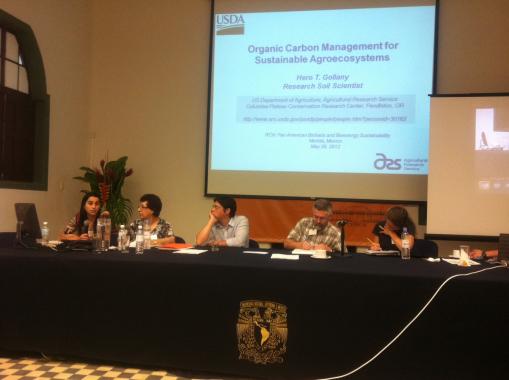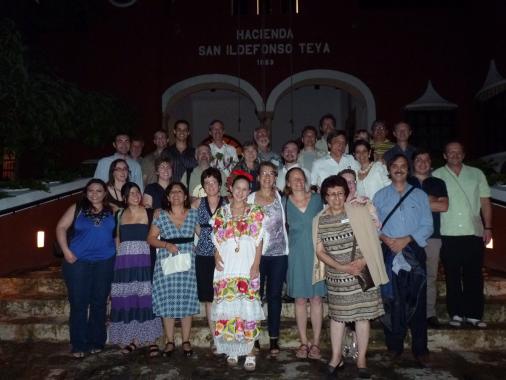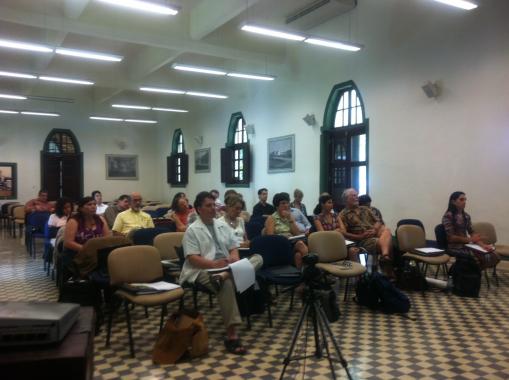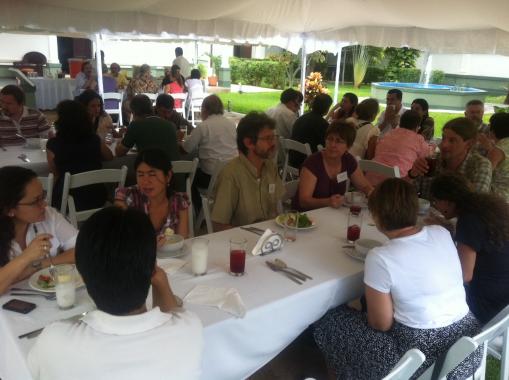UNAM (Universidad Nacional Autónoma de México)
CEPHCIS (Centro Peninsular en Humanidades y Ciencias Sociales)
Prepared by David R. Shonnard, Robbins Professor, Department of Chemical Engineering, Michigan Technological University, Houghton, MI USA
This is a summary of the 1st Workshop for the Pan American Biofuel and Bioenergy Sustainability RCN project, held in Merida, Yucatan, Mexico from May 29-31, 2012 at UNAM CEPHCIS. A summary to come later will provide feedback on the evaluation and assessment of the workshop provided by Drs. Jacqueline (Jackie) Huntoon and Christopher Wojick.
The main items in the agenda for this workshop were:
- Introduce research and teaching interests for each participant,
- Discuss overall projects goals,
- Present and refine the education plan and make initial graduate course preparation assignments,
- Present, discuss, and refine year 3 conference goals and objectives and identify lead coordinators for the preparation of review papers in each bioenergy sustainability dimension,
- Review the approach for communication through a “Hubzero” cyberinfrastructure for the RCN, and
- Participate in the pre and post evaluation sessions plus select interviews.
The following paragraphs will provide more details on each of these workshop items. At the end of this summary, a complete list of workshop participants with affiliations and contact information is provided.
1. Research and Teaching Interests (Tues. May 29, 2012)
Each invited participant presented an oral summary of key research and teaching interests in bioenergy sustainability. Most of the presentations were in a 3x5 format, where approximately 3 slides were used to summarize research expertise and projects in about 5 minutes, and then 5 additional minutes were allowed for questions from the attendees. This format was an effective way to introduce key ideas in a fast-paced manner while subsequently allowing for more in-depth questions and answers.
35 oral presentations were included in the workshop in the following research areas:
- Socioeconomic Issues
- Water-Energy Nexus
- Biodiversity-Ecosystems
- Biogeochemical Cycles
Posters were prepared by workshop participants and viewed at one of the workshop hotels in order to provide more details on specific research projects. Overall, this was an effective way for all workshop participants to learn of the wide scope of research expertise and projects within this RCN and to begin the process of research collaboration. Electronic versions of the oral presentations and posters will be uploaded to the project’s web site for viewing by all of the RCN participants and also the general public.
2. RCN Project Goals (Wed. May 30, 2012, morning)
This session at the Workshop started with an overview presentation by David Shonnard on the broad goals, objectives, milestones, and deliverables of the project. Then Jackie Huntoon presented on the project’s assessment plan.
Later in the morning, four breakout sessions addressing different aspects of the project were conducted:
- Research Collaboration (K. Kline lead)
- Expanding Topics in the RCN (B. Titus lead)
- Increasing Participation (T. Selfa lead)
- Diversity (J. Hilbert lead)
Some ideas from the breakout sessions are presented next. Some breakout groups addressed more than one of the above i-iv topics. For increasing research collaborations across Pan American countries, it was noted that common research methods and protocols should be implemented to assure consistency and that there is a need to select a common set of sustainability metrics / indicators for case studies in different countries. The idea was expressed that we need to move beyond our own disciplines, link with other disciplines, and find out what unifies multiple disciplines over time.
Some possible sources of funding for interdisciplinary bioenergy research were suggested; Canada (CIDA), Mexico (CONACYT), international (CYTED), US (USAID), and embassies. In the area of increasing participation, it was suggested to use existing networks in countries such as the Inter-American Institute of Agricultural Science (IICA and PROCISUR (part of IICA)), the Inter-American Institute (IAI), and the Latin American Organization of Energy (OLADE- Organizacion Latinoamericana de Energia).
Adam Branson and Adriana Otero of the US Department of State and Foreign Agricultural Service (FAS) in Mexico City offered to provide a list of FAS contacts in other Pan American countries. In addition, the FAS office in Mexico publishes an annual bioenergy report and Adam will provide that report to the RCN. Similar reports may be available in other Pan American countries. Through these organizations and reports, we have resources to increase participation.
3. RCN Education Plan and Assignments
This session started with presentations on existing sustainability education programs at Michigan Tech by David Shonnard, at UNT (Universidad Tecnológica Nacional) by Jorge Hilbert, and at the Universidade Federal Rural do Rio de Janeiro (UFRR) by Rodrigo Medeiros. The Michigan Tech program is an interdisciplinary Graduate Certificate in Sustainability featuring two required courses and three elective courses, for 15 semester credits total. The certificate appears on the students MS or PhD diploma.
At UNT in Argentina, the program is a masters degree in renewable energy with one focus area of biomass-based energy production. The program is 2 ½ years in duration and including 650 hours of instruction, involvement of professors from Argentina and abroad, the possibility of research experiences in labs of international collaborators, and original investigations into thesis topics.
At UFRR, the program involves a Global Masters of Development Practice (MDP) degree in sustainable development that is part of an international program organized out of the Earth Systems Institute at Columbia University by Dr. Jeffrey Sachs (http://globalmdp.org/). The Global MDP is a 2-year program featuring a core curriculum in health sciences, natural sciences, social sciences, and management sciences; a global classroom, and field training experiences for a total of 54 credits. The global classroom is described as follows:
“All course materials, including the syllabus, readings, videos, and assignment questions, are uploaded to a common course website. Students from around the world view taped lectures in advance of the course, and then join their classmates and professors for live weekly on-camera sessions. The Global Classroom is "attended" for 14 weeks, beginning in September, and is available to interested organizations, including universities, corporations, and development agencies.”
Then, David Shonnard provided an overview presentation of the proposed 3-semester credit graduate course on Pan American Biofuels and Bioenergy Sustainability. It is anticipated that the course lectures and reading materials will be developed and identified by participants in the RCN and delivered by video conference between the collaborating universities and institutions. Recording of lectures should take place for archiving and also for posting on the RCN web site for students to take online if there are scheduling conflicts with the course period.
Student-led teams will lead a presentation and in-class discussion of more advanced concepts, readings, and case studies. There will be interdisciplinary teams working on term projects where applications of concepts, methods, and analysis tools from the course will be targeted to bioenergy case studies in different Pan American regions. It is planned for a January 2013 start for this course.
This session ended with an open discussion with workshop participants, a refinement of graduate course topics, and assignments for specific course topics.
4. Year 3 Conference Goals and Objectives
David Shonnard provided a short overview of the goals and objectives of the major conference scheduled for year 3 of the RCN. The preliminary location will be in Brazil at a site to be determined, after balancing the following criteria; convenience and expense of the travel, proximity to competence centers in bioenergy (universities, bioenergy firms, and biomass production), reasonable accommodations for lodging, and opportunities for cultural enrichment.
Shonnard presented the following items for the proposed conference during this presentation. These items emphasize expanded participation by academic researchers, government laboratory researchers and managers, industry researchers and managers, NGOs and government policy makers and managers; parallel technical sessions in each of the RCN themes, where a special issue journal will publish conference papers; a plenary sessions for high profile speakers, and a dedicated session on the Research Roadmap Report (RRR).
During and after the presentation of conference items listed above, discussions ensued on the most efficient way to prepare and plan for the conference. Firstly, it was decided to adopt a modified set of sustainability themes compared to the 8 themes in the proposal. These modified themes are the same as listed above as course themes in the education section. In addition, further discussion on preparation for the conference drove home the point that the project needed some concrete deliverables with identified coordinators and timelines.
A research article in each RCN theme will be prepared by a team of participants and lead by one or more coordinators. These articles will be submitted to a special issue in an appropriate sustainability-focused journal prior to the conference in year 3. These articles will also be the basis for each chapter in the RRR. Final versions of each chapter will be completed after including comments and ideas from the expanded group of participants in the year 3 conference. The following list of action items, timelines, and deadlines is based on these conference-related discussions.
The following coordinators (bold) and participants will follow through on preparing and submitting the review papers in each theme.
- Socioeconomic Dimensions (T. Selfa, S. Sweitz, C. Bain, C. Bailey, R. Medeiros)
- Water Issues (D. Watkins, M. Moraes, Alex Mayer, H. Asbjornsen)
- Biodiversity / Ecosystems (M. Zaccagnini, Audrey Mayer)
- Biogeochemical Cycles (H. Gollany, R. Chimner, B. Titus, Sigrid Resh, H. Asbjornsen)
- Life Cycle Assessment / Environment (D. Shonnard, J. Hilbert)
- Energy, Agricultural and Climate Policies (Barry Solomon, Javier Becerril)
Each paper will focus on cross-country comparisons of biofuel / bioenergy sustainability research approaches and methods, datasets, field sites, demonstration and commercial facilities, policies, etc. as appropriate. One other item of discussion concerned a request to have future workshops and the conference be in English, Spanish and Portuguese in order to increase impact on all participants. The costs and benefits of implementing this will be investigated by the project leaders and steering committee prior to September 2012.
5. Review the “Hubzero” cyberinfrastructure for the RCN
Dr. Richard P. Donovan of the Sustainable Futures Institute at Michigan Technological University, provided an overview of the Hubzero collaboration platform to all of the attendees of this workshop. This website will be the primary means of collaboration, posting of biographical information, sharing of documents, organizing the curriculum development products, and working on joint publications.
Workshop Participants
 Workshop participant answering a question on research interests in biofuels sustainability.
Workshop participant answering a question on research interests in biofuels sustainability.
 Workshop participants at the entrance of one of the dinner locations.
Workshop participants at the entrance of one of the dinner locations.
 Workshop attendees listening to one of the research interests presentations.
Workshop attendees listening to one of the research interests presentations.
 Participants networking at workshop lunch at UNAM CEPHCIS site.
Participants networking at workshop lunch at UNAM CEPHCIS site.
